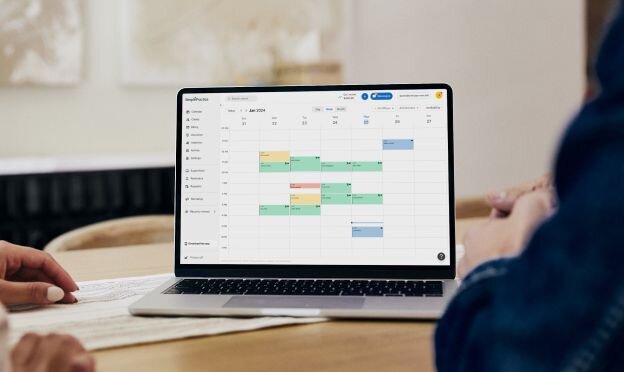Printable coping cards
Download the free coping cards worksheet
Download free resource
Enter your email below to access this resource.
By entering your email address, you are opting-in to receive emails from SimplePractice on its various products, solutions, and/or offerings. Unsubscribe anytime.

Coping cards can be useful tools for therapists to help clients strengthen their coping skills.
This article gives mental health therapists a brief overview of coping skills cards, their benefits, and how coping cards can help reduce anxiety and regulate emotions.
You can also download a free coping cards printable PDF to save to your electronic health record (EHR).
What are coping cards?
Coping cards are practical tools that therapists use to help clients manage difficult emotions and strengthen their distress tolerance skills.
The coping skills cards you use can be printed, digital, or handwritten cards that contain accessible coping strategies to deal with the following:
- Worry
- Stress
- Anxiety
- Anger management
- Panic attacks
- Pain management
- Phobias
- Fear
- Overwhelm
- Depression
- Rumination
The coping skills cards may contain reminders, affirmations, and/or an overview of specific tools to improve distress tolerance, emotional regulation, and mindfulness skills.
As a clinician, you might email clients a set of coping cards or print them off in session for clients to take home.
Examples of coping skills cards
There are hundreds of different types of coping cards available, including:
Coping cards for anxiety and difficult emotions
Anxiety coping cards may include distress tolerance skills like the ACCEPTS skill, DEAR MAN worksheet, STOP skill, and more.
Worry coping cards
Coping statements for worry might include reminding clients to stay present, practice mindfulness strategies like deep breathing, and use cognitive behavioral therapy (CBT) exercises.
CBT coping cards can help clients identify negative thought distortions to reframe their thought patterns.
Skills for depression
Tools like thought records, mindful action, and reminding clients to seek support are helpful strategies for coping with depression.
Positive self-talk coping cards
Certain affirmations and mantras can be helpful during heightened emotions and times of stress, such as:
- This will pass.
- I can do this.
- I can feel angry, sad, and upset while not acting on those feelings and emotions.
- I am not in danger. I am safe.
- I have overcome challenging things.
- While this feels uncomfortable right now, it is only temporary.
- I know they said something hurtful, but I do not need to respond while feeling hurt.
Journal prompts for managing stress
Clients may find it helpful to write specific coping strategies that work for them on a coping skills card. These coping strategies may include playing music, dancing, exercising, taking a hot shower, journaling, or talking with a friend.
These notes on the coping cards can act as visual cues to remind clients what to do to calm themselves down during times of duress.
Virtual boundary reminders
Using technology, like automation, can be a helpful strategy for reminding clients of boundaries with their family or loved ones.
For instance, if the client knows they have an abusive family member, they can set up an automation that reminds them every time they open a messaging app to not pick up the bait.
The automated message can be a simple note added to their family member’s name in their Contacts (like Mom—DON'T ANSWER CALL), or it can be implemented using a specific app or more advanced technology settings.
Distress tolerance mindfulness skills
- Deep breathing: Breathe in for four seconds, hold for four seconds, and breathe out for four seconds.
- 5-4-3-2-1: Name five things you see, four things you feel, three things you can touch, two things you can hear, and one thing you can smell.
- Counting to 10 slowly: Take long, slow breaths in and out as you count to 10. Repeat a few times until you feel calmer.
- Emotional awareness: Be curious about what you are feeling, using an emotion faces card or emotions wheel, and note where that emotion is felt in the body.
Move your body coping card
These coping skills cards may remind clients of their favorite movement activities, like going for a run, walking their dog, or taking an exercise class when they feel upset.
Coping with an urge
Strategies like urge surfing can help clients overcome intense cravings.
Other coping strategies
We have numerous coping strategy worksheets for therapists, including:
- Distress tolerance skills worksheet
- Emotional regulation worksheets
- Daily mood chart
- “What is worry?” worksheet
- Boundaries worksheets
- DBT Wise Mind worksheet
- CBT for anxiety worksheets
- Safety plan worksheet for therapists
- Coping skills for depression worksheet
You can use the coping cards worksheet in session, to illustrate the coping skills cards or as a handout to empower clients to strengthen their emotional regulation and distress tolerance skills outside sessions.
Sources
- Anxiety and Depression Association of America. Tips and strategies to manage anxiety and stress.
- Pombo, E. (2019). Self-help techniques for coping with mental illness. National Alliance on Mental Illness.
- National Institute of Mental Health. (n.d.). I’m so stressed out fact sheet.
- Montana School of Public Instruction. (n.d.) Mental Wellness Coping Statement Cards.
- University of California, Santa Cruz. (n.d.). Coping cards for anxiety and difficult emotions.
- Vivyan, C. (2011). Positive self-talk/coping thoughts worksheet.
How SimplePractice streamlines running your practice
SimplePractice is HIPAA-compliant practice management software with everything you need to run your practice built into the platform—from booking and scheduling to insurance and client billing.
If you’ve been considering switching to an EHR system, SimplePractice empowers you to streamline appointment bookings, reminders, and rescheduling and simplify the billing and coding process—so you get more time for the things that matter most to you.
Try SimplePractice free for 30 days. No credit card required.


